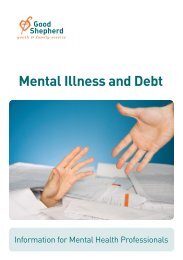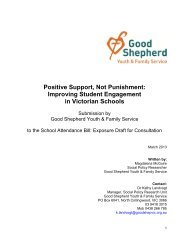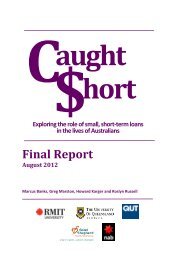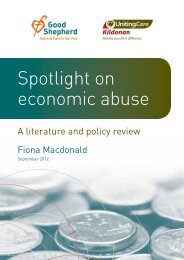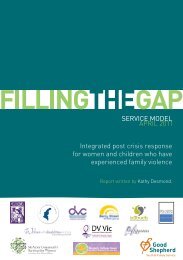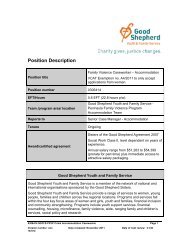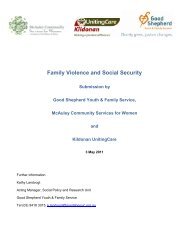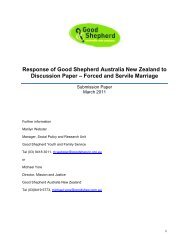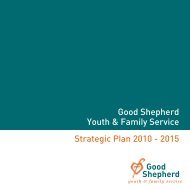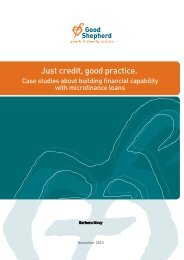Spotlight on economic abuse - Good Shepherd Youth & Family ...
Spotlight on economic abuse - Good Shepherd Youth & Family ...
Spotlight on economic abuse - Good Shepherd Youth & Family ...
You also want an ePaper? Increase the reach of your titles
YUMPU automatically turns print PDFs into web optimized ePapers that Google loves.
elati<strong>on</strong>ships; sibling relati<strong>on</strong>ships; domestic relati<strong>on</strong>ships; relatives through blood, marriage,<br />
or cultural, ethnic or religious beliefs (including kinship relati<strong>on</strong>ships); and relati<strong>on</strong>ships of<br />
dependency, or involving pers<strong>on</strong>al or financial commitment (ABS 2009, p. 9).<br />
Within the practice and research literature c<strong>on</strong>cerned with domestic and family violence,<br />
definiti<strong>on</strong>s of ec<strong>on</strong>omic <strong>abuse</strong> are somewhat broader. For example Tolman (2011 p. 1)<br />
identifies ec<strong>on</strong>omic <strong>abuse</strong> “in its broadest c<strong>on</strong>ceptualisati<strong>on</strong>s, (as) the set of behaviors<br />
designed to harm women’s ec<strong>on</strong>omic wellbeing”. Similarly Adams and colleagues (Adams et<br />
al. 2008, p. 564) describe ec<strong>on</strong>omic <strong>abuse</strong> as involving behaviours that ‘c<strong>on</strong>trol a woman’s<br />
ability to acquire, use, and maintain ec<strong>on</strong>omic resources, thus threatening her ec<strong>on</strong>omic<br />
security and potential for self-sufficiency’.<br />
Recent research, reports from practiti<strong>on</strong>ers and reviews of family and domestic violence<br />
research have identified types of behaviours which can c<strong>on</strong>stitute ec<strong>on</strong>omic <strong>abuse</strong>. For<br />
example, from her research in the United Kingdom, Sharp (2008, pp. 1-2) identified these<br />
four types of <strong>abuse</strong>:<br />
<br />
<br />
<br />
<br />
interfering with educati<strong>on</strong> and employment<br />
c<strong>on</strong>trolling access to ec<strong>on</strong>omic resources<br />
refusing to c<strong>on</strong>tribute<br />
generating ec<strong>on</strong>omic cost.<br />
Based <strong>on</strong> their review of research in the United States, Adams et al. (2008) identified three<br />
types of ec<strong>on</strong>omic <strong>abuse</strong>:<br />
<br />
<br />
<br />
preventing women from acquiring resources<br />
preventing women from using resources<br />
exploiting women’s resources.<br />
Combining these, the following four types of behaviours can be identified:<br />
<br />
<br />
<br />
<br />
Preventing acquisiti<strong>on</strong> of ec<strong>on</strong>omic resources:<br />
o through interfering with educati<strong>on</strong>, training and employment<br />
o through preventing acquisiti<strong>on</strong> of other ec<strong>on</strong>omic resources.<br />
Preventing use of resources/c<strong>on</strong>trolling access to ec<strong>on</strong>omic resources.<br />
Refusing to c<strong>on</strong>tribute.<br />
Exploiting women’s resources and/or generating ec<strong>on</strong>omic costs.<br />
Examples of these types of behaviours are identified in recent research studies from<br />
Australia (Braaf & Barrett Meyering 2011; Branigan 2004; Branigan 2007; Fraser, Hunter &<br />
Borrell 2011; McFerran 2011), the UK (Refuge 2005; Sharp 2008), the USA (Adams et al.<br />
2008; Anders<strong>on</strong> et al. 2003; Moe & Bell 2004; Postmus et al. 2012; Tolman & Wang 2005),<br />
and Canada (Power 2006).<br />
5



